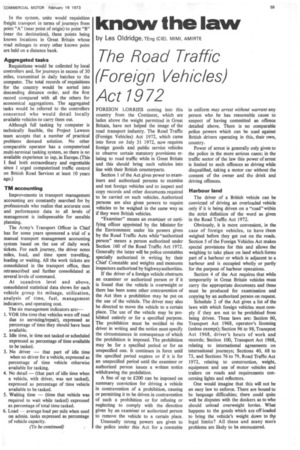know the law
Page 61

If you've noticed an error in this article please click here to report it so we can fix it.
by Les Oldridge, TEng (CIEI, MIMI, AMIRTE
The Road Traffic (Foreign Vehicles) Act19 72
FOREIGN LORRIES coming into this country from the Continent, which are laden above the weight permitted in Great Britain, have not helped the image of the road transport industry. The Road Traffic (Foreign Vehicles) Act 1972, which came into force on July 31 1972, now requires foreign goods and public service vehicles to observe certain statutory provisions relating to road traffic while in Great Britain and this should bring such vehicles into line with their British counterparts.
Section 1 of the Act gives power to examiners and authorized persons to examine and test foreign vehicles and to inspect and copy records and other documents required to be carried on such vehicles. Authorized persons are also given powers to require vehicles to be weighed in the same way as if they were British vehicles.
"Examiner" means an examiner or certifying officer appointed by the !Allister for the Environment under his powers given by the Road Traffic. Acts while "authorized person" means a person authorized under Section 160 of the Road Traffic Act 1972. Generally the latter will be police constables specially authorized in writing by their Chief Constable and weights and measures inspectors authorized by highwayauthorities.
If the driver of a foreign vehicle obstructs an examiner or authorized person or if it is found that the vehicle is overweight or there has been some other contravention of the Act then a prohibition may be put on the use of the vehicle. The driver may also be directed to move the vehicle to a certain place. The use of the vehicle may be prohibited entirely or for a specified purpose. The prohibition must be notified to the driver in writing and the notice must specify the circumstances in consequence of which the prohibition is imposed. The prohibition may be for a specified period or for an unspecified one. It continues in force until the specified period expires or if it is for an unspecified period until the examiner or authorized person issues a written notice withdrawing the prohibition.
A fine of up to £200 can be imposed on summary conviction for driving a vehicle in contravention of a prohibition, causing or permitting it to be driven in contravention of such a prohibition or for refusing or neglecting to comply with the direction given by an examiner or authorized person to remove the vehicle to a certain place.
Unusually strong powers are given to the police under this Act for a constable
in uniform may arrest without warrant any person who he has reasonable cause to suspect of having committed an offence detailed above. There is no comparable police powers which can be used against British drivers operating in this, their own, country.
Power of arrest is generally only given to the police in the more serious cases; in the traffic sector of the law this power of arrest is limited to such offences as driving while disqualified, taking a motor car without the consent of the owner and the drink and driving offences.
Harbour land
The driver of a British vehicle can be convicted of driving an overloaded vehicle only if it is being driven on a "road" within the strict definition of the word as given in the Road Traffic Act 1972.
Obviously, it is more convenient, in the case of foreign vehicles, to have them weighed before they get out on the roads. Section 5 of the Foreign Vehicles Act makes special provisions for this and allows the weighing to take place on land which forms part of a harbour or which is adjacent to a harbour and is occupied wholly or partly for the purpose of harbour operations.
Section 4 of the Act requires that while temporarily in Great Britain vehicles must carry the appropriate documents and these must be produced for examination and copying by an authorized person on request.
Schedule 2 of the Act gives a list of the laws with which foreign vehicles must comply if they are not to be prohibited from being driven. These laws are: Section 60, Transport Act 1968, operator's licensing (unless exempt); Section 96 to 98, Transport Act 1968, driver's hours of work and records; Section 100, Transport Act 1968, relating to international agreements on international journeys; Sections 40, 68 to 73, and Sections 76 to 79, Road Traffic Act 1972, relating to construction, weight, equipment and use of motor vehicles and trailers on roads and requirements concerning lights and reflectors.
One would imagine that this will not be an easy law to enforce. There are bound to be language difficulties; there could quite well be disputes with the dockers as to who should unload overweight lorries. What happens to the goods which are off-loaded to bring the vehicle's weight down to the legal limits? All these and many more problems are likely to be encountered.












































































































